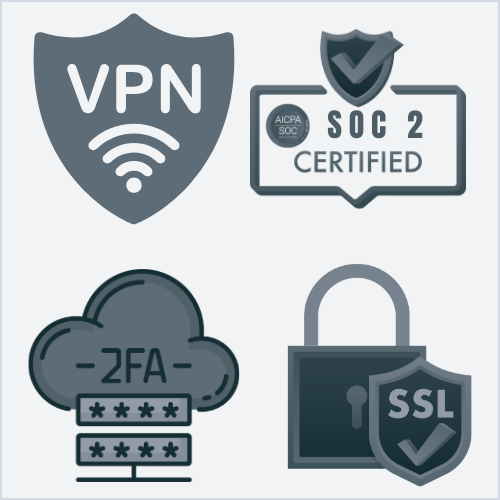Kloudle is founded by two experienced security experts. We have hacked, secured, tested 100s of cloud environments for customers ranging from Governments, Banks, LEA, Fortune 1000, Unicorns. With a combined experience of 35+ Years we understand how to maintain security as our highest priority.
We follow security by default principles and follow the best product security practices while building and deploying Kloudle product. We take operational security seriously and implement the required preventive security controls that allow us to stay secure and keep your data safe.

We have undergone a rigorous process for getting compliant with SOC 2 Type I and then a detailed infosec audit to get our Type 2 certificate. Using the best security controls provided by Google Cloud Platform our product deployments follow zero touch in prod approach.
We just don't say we follow the best securit practices. We dog food our own product and use Kloudle to monitor Kloudle's various cloud resources for security and compliance.
All code, product infra, team members and processes are verified and accepted as part of the SOC 2 requirement. All internal processes are reviewed periodically for compliance.
We never store your login passwords. We use Single Sign On (SSO) or temporary links/codes for all access. We use popular SDKs from Google Firebase, Kinde to provide access.
All data stored in the product, all cloud credentials and metadata, is encrypted using server side encrpytion (SSE) at rest.
Whenever your data is in transit it is encrypted using extremely secure RSA 2048 bit keys. All connections by default are established with TLS 1.2 version
Your cloud access credentials are temporarily stored in Google Secrets Manager using the offical SDK. These are purged within 24 hours of a scan being completed.
Kloudle is hosted on Google Cloud Platform. Our scanners use Google's managed compute services and enterprise architecture patterns ensuring reliability, performance and scale.
No. Kloudle does not have a Bug Bounty program, private or public. Neither do we offer swag for unsolicited security reports.
Although, active testing of Kloudle's app and infrastructure is not permitted, if you think you have found a security issue,
you can report it in the following manner based on where the issue is present:
We do not consider vulnerability reports which do not include careful manual validation - for example reports based only on automated tools and scanners or repots that describe theoretical attack scenarios without proof of exploitability. This is a non-exhaustive list of reports that we don't consider to be a security problem across the website, the app and other KLOUDLE domains:
Yes. We encourage you to encrypt any sensitive information that you send to our security email address using GPG.
Please use this key GPG Key.
Key fingerprint - FA34 DE35 8B09 C828 D810 06D1 7B4B 7540 6E4B F413
Please send your queries to security@kloudle.com. We respond to security related queries only on this email. Expect a turnaround time of at least 3 to 4 business days. For any other information related to the product, signup, subscription, billing etc., please use our contact page.
We are small super technical team, dedicated to making sure you can secure your cloud effortlessly. We can do this by staying secure for ourselves and you.